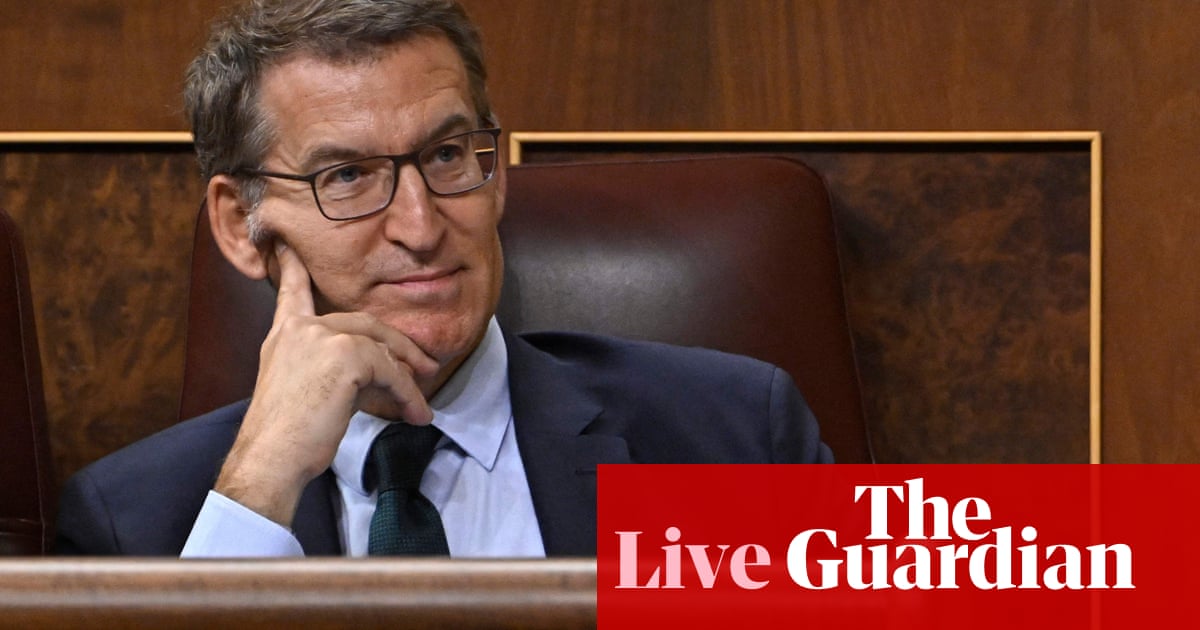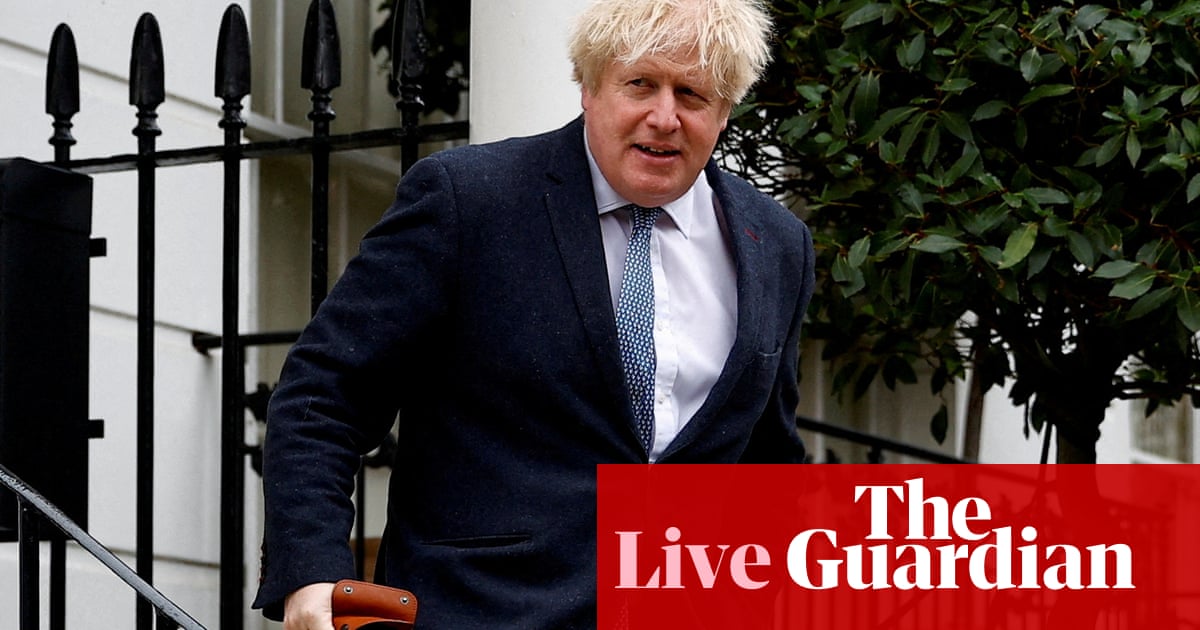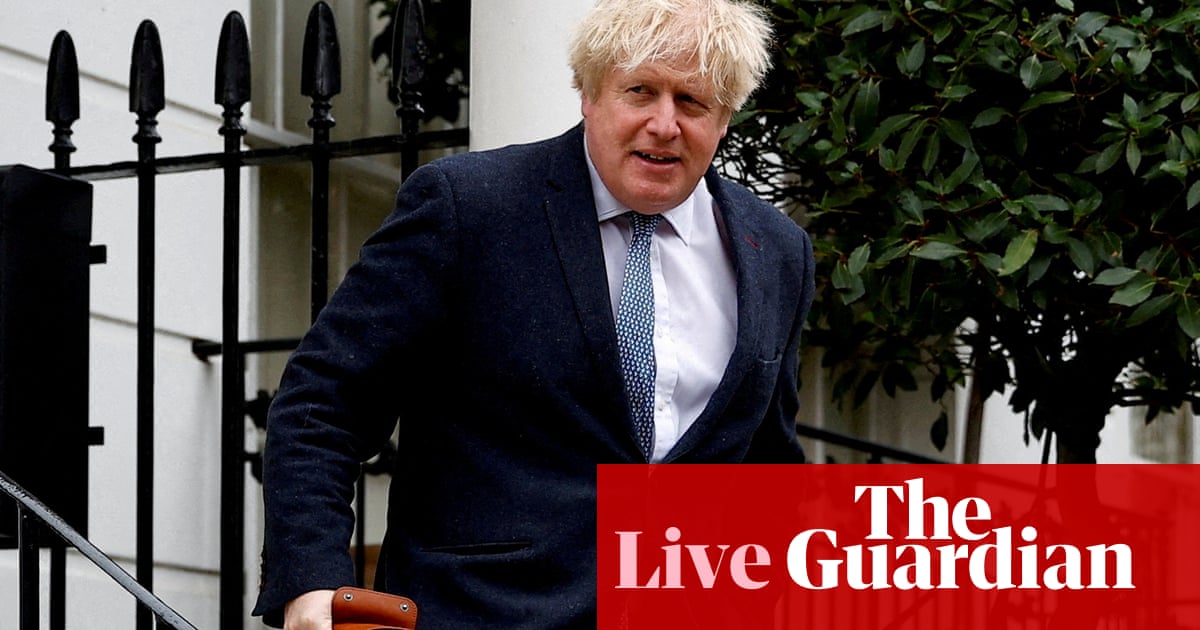
Johnson says he is confident he has enough backing from Tory MPs to survive as party leader and PM
And here is a full summary of what Boris Johnson said in his pooled TV interview in Stockton-on-Tees.
Johnson described the measures announced by Rishi Sunak yesterday as a “big bazooka” but conceded it would not “fix everything for everybody”. (See 12.47pm.)
He said he was confident Tory MPs would continue to back him. Asked if he was confident that he had enough backing in his party to survive, given that more MPs are calling for his resignation following the publication of the Sue Gray report, he replied:
Yes, but I think I gave some some pretty vintage and exhaustive answers on all that subject the other day in the House of Commons and then in a subsequent press conference .
He rejected claims that there was now no difference between Labour and the Tories on tax and spend. This has been a charge levelled by Tory commentators. (See 12.36pm.) Asked to explain the difference between the two parties, Johnson replied:
Very simple. When it comes to this particular policy, it’s much more generous [than Labour’s proposal]. This gives a £1,200 for every 8 million households.
But what it also does is, the levy is designed so that companies can offset investments that they’re making in new energy supply, or in green technology, to the tune of 91p in the pound.
Johnson was wrong on this point. The investment allowance is just for investment in oil and gas extraction.
He defended the decision to make the extra support for people time limited. It was designed to get people through the difficult period until inflation went down, he said. After that the economy would be in a strong position because of high employment, he said.
The reason we’re going to be a strong position is because we have so many people in work giving us the tax base we need to look after everybody else.
He said that he did not think the measures announced yesterday would add to inflation because they would not trigger more discretionary spending. This was slightly different from the answer Sunak gave when he was asked about this earlier; he said the impact would be “minimal”, adding to inflation by less than 1%.
He refused to follow Sunak in saying he would donate his £400 energy bills grant to charity, saying that because he lived in a government flat, his arrangements were different. Asked if he would do what Sunak was doing, he said: “I think my arrangements are different because I live in a government flat,” he said. It is understood that Johnson does make a contribution to the utility bills for his grace and favour flat at Downing Street, but he is not a conventional tenant. He also owns a home in Oxfordshire, which is understood to be rented out, and he is the joint owner, with his wife, of a house in London. These properties should benefit from the £400 grant too, but it would go to whoever pays the electricity bill.
Afternoon summary
Boris Johnson has suffered the first resignation of a PPS since the publication of Sue Gray’s damning report into Partygate with the departure of Paul Holmes as a ministerial aide to the home secretary. But Johnson has said he is confident that Conservative MPs will continue to back him as party leader and PM. (See 1.55pm.)
Johnson is changing the rules to let ministers avoid resigning if they break the ministerial code, allowing them to apologise or temporarily lose their pay instead.
Johnson has said the UK is “not necessarily” heading for a recession after his chancellor announced a £15bn package to help people deal with rising energy bills and inflation.
Shell has said Rishi Sunak’s windfall tax is a threat to investment in North Sea oil and gas as Britain attempts to ramp up domestic energy supplies.
Johnson has said Ukraine should be supplied with long-range multiple launch rocket systems (MLRS) to help Kyiv’s embattled forces prevent Russian invaders from gaining ground in the Donbas.
Dominic Cummings, Johnson’s former chief aide, was never contacted by police seeking information about alleged lockdown-breaching parties inside Downing Street during his time working there, he has said.
That’s it from us for today. You can read our latest story on Boris Johnson here:
According to today’s figures from the Office for National Statistics’ coronavirus infection survey, Covid rates continue to fall in England, Wales and Northern Ireland.
For the week ending last Saturday the rates were:
England - around one person in 60 infected
Wales - aroundone person in 55 infected
Northern Ireland - around one person in 80 infected
And in Scotland the trend was uncertain, the ONS says. It says one person in 40 was infected in Scotland last week.
Labour says ministerial code revisions show PM is "debasing principles of public life before our very eyes"
As my colleague Rowena Mason writes in her story on the changes to the ministerial code, Boris Johnson has also rewritten the foreword to the code, removing all references to honesty, integrity, transparency and accountability. Rowena writes:
In his first foreword, published in 2019, he wrote: “There must be no bullying and no harassment; no leaking; no breach of collective responsibility. No misuse of taxpayer money and no actual or perceived conflicts of interest. T
“The precious principles of public life enshrined in this document – integrity, objectivity, accountability, transparency, honesty and leadership in the public interest – must be honoured at all times; as must the political impartiality of our much admired civil service.”
The 2022 foreword simply lists the government’s priorities, with only a brief mention of standards and behaviour of ministers, saying: “Thirty years after it was first published, the ministerial code continues to fulfil its purpose, guiding my ministers on how they should act and arrange their affairs. As the leader of Her Majesty’s government, my accountability is to parliament and, via the ballot box, to the British people.”
Commenting on the changes, Angela Rayner, Labour’s deputy leader, said:
Boris Johnson has today rewritten his own foreword to the ministerial code, removing all references to integrity, objectivity, accountability, transparency, honesty and leadership in the public interest. This prime minister is downgrading and debasing the principles of public life before our very eyes.
In a week when Boris Johnson’s lies to parliament about industrial rule-breaking at the heart of government were finally exposed, he should be tendering his resignation but is instead watering down the rules to save his own skin.
Once again, Boris Johnson has demonstrated he is not serious about his pledge to address the scandal and sleaze engulfing his Government or the frequent and flagrant breaches of standards and rule-breaking that have taken place on his watch.
Labour’s independent integrity and ethics commission will stamp out Conservative corruption and restore the trust in public office this Prime Minister has eroded.
PM won"t be able to block inquiry by No 10 standards adviser without publicly having to say why, revised code says
The updated ministerial code also strengthens the power of the independent adviser on ministerial standards (officially known as the independent adviser on ministerial interests), who is currently Lord Geidt.
The independent adviser investigates alleged breaches of the ministerial code by ministers, but in the past they have only been able to do this when the PM orders an inquiry. For years campaigners have been saying the system would be more robust if the adviser could initiate an inquiry without getting permission first.
Geidt was appointed after the previous adviser, Sir Alex Allan, resigned after Boris Johnson refused to sack Priti Patel after Allan published a report saying she broke the ministerial code. In a very minor concession to Geidt, his terms of reference said that if he thought an investigation was needed, he could confidentially suggest that to the PM. But the PM still had the final word as to whether one would go ahead.
Under the new code of conduct, the PM still has the final word over whether an inquiry happens. But the code says the adviser can now force the PM to release a public statement saying why he is not allowing an inquiry unless there are public interest reasons for keeping that confidential.
It says:
Where the independent adviser believes that an alleged breach of the code warrants further investigation and that matter has not already been referred to him, he may initiate an investigation. Before doing so, the independent adviser will consult the prime minister who will normally give his consent. However, where there are public interest reasons for doing so, the prime minister may raise concerns about a proposed investigation such that the independent adviser does not proceed. In such an event, the independent adviser may still require that the reasons for an investigation not proceeding be made public unless this would undermine the grounds that have led to the investigation not proceeding.
Ministers should not always have to resign for breaking ministerial code, revised version says
Ministers who are found to have broken the ministerial code will not automatically be expected to resign, the government said today.
The Cabinet Office has issued an updated version of the code and, in a document explaining revisions to it, it says the document now explicitly says that a breach of the code is not automatically a resignation offence. It says:
As both Lord Geidt [the independent adviser on ministerial standards] and the Committee on Standards in Public Life have recommended last year, it is disproportionate to expect that any breach, however minor, should lead automatically to resignation or dismissal. The sanction which the prime minister may decide to issue in a given case is for the prime minister to determine, but could include requiring some form of public apology, remedial action or removal of ministerial salary for a period. The ministerial code has been updated to reflect this.
In the past it has often been assumed that a breach of the code should automatically be a resignation offence but in practice this has not always been the case. Priti Patel was not forced to resign as home secretary despite an investigation finding she broke the code by bullying staff.
However the new version of the code, like the old one, still says that lying to parliament should be a resignation offence. “Ministers who knowingly mislead parliament will be expected to offer their resignation to the prime minister,” it says.
Boris Johnson is currently facing an investigation by the Commons privileges committee into claims he misled MPs about Partygate.
Dominic Cummings, Boris Johnson’s former chief adviser, disclosed in a post on his Substack account earlier this week that he had not been fined by the Metropolitan police over Partygate. Today he has said on Twitter that he did not even get a questionnaire from the police, or an email asking for evidence.
Cummings was one of the people who helped to trigger the police investigation by revealing in January that No 10 held a party for staff in the garden on 20 May 2020 despite Cummings warning that it would be against the rules.
But most of the events investigated by the police took place after Cummings left No 10 on 13 November 2020.
Johnson says he is confident he has enough backing from Tory MPs to survive as party leader and PM
And here is a full summary of what Boris Johnson said in his pooled TV interview in Stockton-on-Tees.
Johnson described the measures announced by Rishi Sunak yesterday as a “big bazooka” but conceded it would not “fix everything for everybody”. (See 12.47pm.)
He said he was confident Tory MPs would continue to back him. Asked if he was confident that he had enough backing in his party to survive, given that more MPs are calling for his resignation following the publication of the Sue Gray report, he replied:
Yes, but I think I gave some some pretty vintage and exhaustive answers on all that subject the other day in the House of Commons and then in a subsequent press conference .
He rejected claims that there was now no difference between Labour and the Tories on tax and spend. This has been a charge levelled by Tory commentators. (See 12.36pm.) Asked to explain the difference between the two parties, Johnson replied:
Very simple. When it comes to this particular policy, it’s much more generous [than Labour’s proposal]. This gives a £1,200 for every 8 million households.
But what it also does is, the levy is designed so that companies can offset investments that they’re making in new energy supply, or in green technology, to the tune of 91p in the pound.
Johnson was wrong on this point. The investment allowance is just for investment in oil and gas extraction.
He defended the decision to make the extra support for people time limited. It was designed to get people through the difficult period until inflation went down, he said. After that the economy would be in a strong position because of high employment, he said.
The reason we’re going to be a strong position is because we have so many people in work giving us the tax base we need to look after everybody else.
He said that he did not think the measures announced yesterday would add to inflation because they would not trigger more discretionary spending. This was slightly different from the answer Sunak gave when he was asked about this earlier; he said the impact would be “minimal”, adding to inflation by less than 1%.
He refused to follow Sunak in saying he would donate his £400 energy bills grant to charity, saying that because he lived in a government flat, his arrangements were different. Asked if he would do what Sunak was doing, he said: “I think my arrangements are different because I live in a government flat,” he said. It is understood that Johnson does make a contribution to the utility bills for his grace and favour flat at Downing Street, but he is not a conventional tenant. He also owns a home in Oxfordshire, which is understood to be rented out, and he is the joint owner, with his wife, of a house in London. These properties should benefit from the £400 grant too, but it would go to whoever pays the electricity bill.
A colleague who answered the phone at Paul Holmes’ constituency office said the MP had nothing further to add when asked if he was calling for Boris Johnson to resign, PA Media reports. Holmes has resigned as a PPS over Partygate. (See 1.01pm.)
In his Bloomberg interview, Boris Johnson said he did not accept that the UK was inevitably heading for a recession. My colleague Graeme Wearden has the details on his business live blog.












